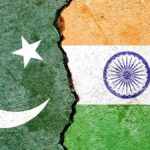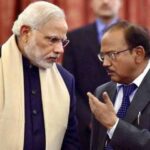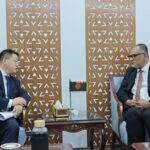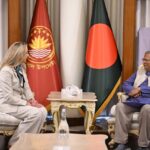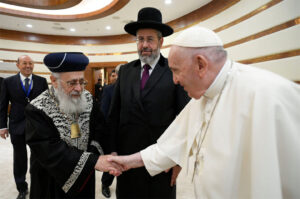 Moon Desk: Against the backdrop of Russia’s invasion of Ukraine, Pope Francis told the Russian Orthodox hierarchy and other faith leaders on Wednesday that religion must never be used to justify the “evil” of war and that God must never “be held hostage to the human thirst for power.”
Moon Desk: Against the backdrop of Russia’s invasion of Ukraine, Pope Francis told the Russian Orthodox hierarchy and other faith leaders on Wednesday that religion must never be used to justify the “evil” of war and that God must never “be held hostage to the human thirst for power.”
Francis opened an interfaith conference in the former Soviet republic of Kazakhstan by challenging delegations to unite in condemning war and the religious justifications for it. He cited a Kazakh poet in warning that “he who permits evil and does not oppose it cannot be regarded as a true believer. At best he is a half-hearted believer.”
In the audience of the 80 imams, patriarchs, rabbis and muftis were Metropolitan Anthony, in charge of foreign relations for the Russian Orthodox Church, which has firmly backed Russia’s invasion. His boss, Patriarch Kirill, was supposed to have participated in the congress but canceled last month.
Kirill has justified Russia’s invasion on spiritual and ideological grounds, calling it a “metaphysical” battle with the West. He has blessed Russian soldiers going into war and invoked the idea that Russians and Ukrainians are one people.
Francis didn’t mention Russia or Ukraine in his remarks at the Kazakh conference. But he insisted that faith leaders themselves must take the lead in promoting a culture of peace since it would be hypocritical to expect that non-believers would promote peace if religious leaders don’t.
“If the creator, to whom we have devoted our lives, is the author of human life, how can we who call ourselves believers consent to the destruction of that life?” he asked. “Mindful of the wrongs and errors of the past, let us unite our efforts to ensure that the Almighty will never again be held hostage to the human thirst for power.”
Francis then laid down a challenge to all those in the room to commit themselves to resolve disputes through dialogue and negotiation, not with recourse to arms.
“May we never justify violence. May we never allow the sacred to be exploited by the profane. The sacred must never be a prop for power, nor power a prop for the sacred!”
Kirill, for his part, sent a message to the congress read aloud by Anthony. In it, the Russian patriarch didn’t refer to the war but in general to problems caused by “attempts to build a world without relying on moral values.”
The Russian patriarch has blasted the West’s secular mentality and claimed the seeds of the Ukraine conflict were sown by foreign threats to Russia’s borders. He has depicted the conflict as a struggle against a foreign liberal establishment purportedly demanding countries hold “gay parades” as the price of admission to a world of excess consumption and freedom.
“These attempts have led not only to the loss of the concept of justice in international relations but also to brutal confrontation, military conflicts, the spread of terrorism and extremism in different parts of the world,” said Kirill’s message.
Suggesting he felt Russia was the victim of a smear campaign, he denounced the spread of misinformation, and the “distortion of historical facts” and “manipulation of mass consciousness” to spread messages of “hatred towards entire peoples, cultures and religions.”
In addition to the Russian Orthodox delegation, the religious leaders included Sheikh Ahmed al-Tayeb, the grand imam of Al-Azhar, the seat of Sunni learning in Cairo, who warmly greeted Francis with a kiss on the cheek when the pope arrived in a wheelchair.
Francis and al-Tayeb signed a joint Christian-Muslim document promoting human fraternity as a force for peace in 2019 – a document that Kazakh President Kassym-Jomart Tokayev cited in his own speech opening the congress. Al-Tayeb was later given a special award by the Kazakh organizers for his interfaith work.
Before Kirill bowed out, there had been speculation that Francis could meet with Kirill on the sidelines of the congress after both confirmed their presence earlier this year. The two met for the first time in 2016 in Cuba – the first-ever meeting of a pope and Russian patriarch – and spoke by videoconference in the early weeks of the war.
Francis afterward publicly criticized Kirill’s justification of Russia’s invasion and warned that he mustn’t become “Putin’s altar boy.”
Speaking to reporters in perfect Italian after he met with Francis, Anthony said Francis’ “altar boy” comment didn’t go over well in Moscow. “It wasn’t expected and clearly it’s not useful for the unity of Christians,” he said. “It was a surprise. But we know we have to move on.”
He said a Kirill-Francis meeting was still possible, but insisted it had to be well-prepared ahead of time and must produce a concrete joint statement issued afterward, as was done after the Havana meeting.
In addition to the meeting with Anthony, Francis was also meeting with al-Tayeb, the head of Russia’s religious council of Muslims, Mufti Sheikh Ravil Gaynutdin, as well as other Orthodox, Jewish, Lutheran and Muslim leaders.
Another visitor in Kazakhstan on Wednesday was apparently not on Francis’ agenda: Chinese President Xi Jinping was arriving in Nur-Sultan on his first state visit outside China since the coronavirus pandemic. Vatican and Kazakh officials said they didn’t expect Xi would meet with the pope during his brief visit to a key economic and political ally in the region.
